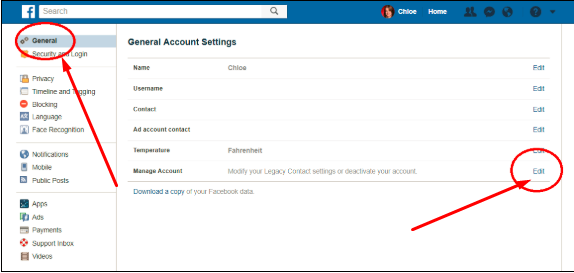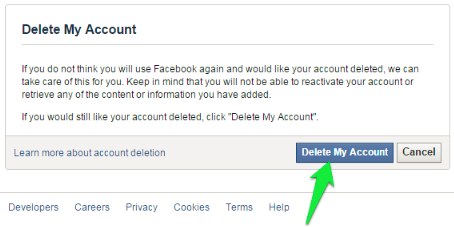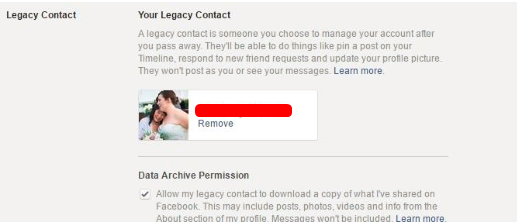How to Remove My Account From Facebook
By
Anjih Najxu
—
Jan 29, 2019
—
Deleting Facebook Account
Recent events could have you considering a break from Facebook. That's not an alternative for everybody; in that instance, just tighten up your account settings. How to Remove My Account From Facebook: But if having your information mined for political functions without your approval sketches you out, there are ways to separate on your own from the massive social media.

If you're ready for a social networks break, here's ways to remove Facebook.
Deactivating
Facebook gives you 2 choices: two alternatives: deactivate or remove
The first couldn't be simpler. On the desktop, click the drop-down menu at the top-right of your display and select settings. Click General on the leading left, Edit next to "Manage Account" Scroll down and also you'll see a "Deactivate My Account" web link near the bottom. (Right here's the direct link to make use of while logged in.).
If you're on your smart phone, such as utilizing Facebook for iOS, likewise go to settings > Account settings > General > Manage Account > Deactivate.

Facebook doesn't take this lightly - it'll do whatever it can to maintain you around, including emotional blackmail about how much your friends will certainly miss you.
As such, "Deactivation" is not the same as leaving Facebook. Yes, your timeline will disappear, you won't have access to the site or your account by means of mobile applications, friends cannot upload or contact you, and also you'll shed accessibility to all those third-party services that utilize (or need) Facebook for login. But Facebook does not delete the account. Why? So you can reactivate it later on.
Simply in case that expected re-activation isn't really in your future, you need to download a copy of all your data on Facebook - posts, pictures, videos, talks, etc.-- from the settings menu (under "General"). Exactly what you discover could stun you, as our Neil Rubenking discovered.
Account Deletion

To fully erase your Facebook account forever and ever, most likely to the Erase My Account web page at https://www.facebook.com/help/delete_account. Just understand that, per the Facebook data use policy "after you eliminate details from your account or erase your account, copies of that info could continue to be viewable somewhere else to the degree it has been shown to others, it was or else distributed according to your privacy settings, or it was replicated or stored by various other individuals.".
Translation: if you composed a talk about a good friend's status upgrade or photo, it will certainly continue to be even after you remove your personal profile. Some of your posts and also pictures could spend time for as long as 90 days after deletion, as well, though simply on Facebook servers, not live on the website.
Deletion in support of Others
If you want to alert Facebook regarding a customer you understand is under 13, you could report the account, you narc. If Facebook could "sensibly validate" the account is used by someone underage-- Facebook outlaws youngsters under 13 to comply with federal regulation-- it will delete the account instantly, without informing any person.
There's a separate type to request removal of accounts for people who are medically incapacitated and therefore incapable to make use of Facebook. For this to function, the requester has to verify they are the guardian of the individual concerned (such as by power of attorney) in addition to offer an official note from a doctor or clinical center that spells out the incapacitation. Edit any kind of information required to keep some privacy, such as medical account numbers, addresses, and so on.
If a user has passed away, a legacy contact-- a Facebook good friend or loved one who was designated by the account owner before they passed away-- could get accessibility to that individual's timeline, when accepted by Facebook. The heritage get in touch with could should supply a connect to an obituary or various other paperwork such as a fatality certification. Facebook will certainly "hallow" the page so the dead timeline lives on (under control of the legacy contact, that can not publish as you), or if favored, remove it.

Assign a specific heritage call person to handle your account after your passing away. You could find that under settings > General > Manage Account > Your Legacy Contact. Once you set one up, you'll obtain a notification annually from Facebook to check that the contact should remain the exact same, unless you opt out of that. You can also take the additional step of ensuring that after you die, if the tradition contact does report you to Facebook as deceased, your account gets erased (even if the tradition contact desires the timeline to be memorialized).

If you're ready for a social networks break, here's ways to remove Facebook.
How to Remove My Account From Facebook
Deactivating
Facebook gives you 2 choices: two alternatives: deactivate or remove
The first couldn't be simpler. On the desktop, click the drop-down menu at the top-right of your display and select settings. Click General on the leading left, Edit next to "Manage Account" Scroll down and also you'll see a "Deactivate My Account" web link near the bottom. (Right here's the direct link to make use of while logged in.).
If you're on your smart phone, such as utilizing Facebook for iOS, likewise go to settings > Account settings > General > Manage Account > Deactivate.

Facebook doesn't take this lightly - it'll do whatever it can to maintain you around, including emotional blackmail about how much your friends will certainly miss you.
As such, "Deactivation" is not the same as leaving Facebook. Yes, your timeline will disappear, you won't have access to the site or your account by means of mobile applications, friends cannot upload or contact you, and also you'll shed accessibility to all those third-party services that utilize (or need) Facebook for login. But Facebook does not delete the account. Why? So you can reactivate it later on.
Simply in case that expected re-activation isn't really in your future, you need to download a copy of all your data on Facebook - posts, pictures, videos, talks, etc.-- from the settings menu (under "General"). Exactly what you discover could stun you, as our Neil Rubenking discovered.
Account Deletion

To fully erase your Facebook account forever and ever, most likely to the Erase My Account web page at https://www.facebook.com/help/delete_account. Just understand that, per the Facebook data use policy "after you eliminate details from your account or erase your account, copies of that info could continue to be viewable somewhere else to the degree it has been shown to others, it was or else distributed according to your privacy settings, or it was replicated or stored by various other individuals.".
Translation: if you composed a talk about a good friend's status upgrade or photo, it will certainly continue to be even after you remove your personal profile. Some of your posts and also pictures could spend time for as long as 90 days after deletion, as well, though simply on Facebook servers, not live on the website.
Deletion in support of Others
If you want to alert Facebook regarding a customer you understand is under 13, you could report the account, you narc. If Facebook could "sensibly validate" the account is used by someone underage-- Facebook outlaws youngsters under 13 to comply with federal regulation-- it will delete the account instantly, without informing any person.
There's a separate type to request removal of accounts for people who are medically incapacitated and therefore incapable to make use of Facebook. For this to function, the requester has to verify they are the guardian of the individual concerned (such as by power of attorney) in addition to offer an official note from a doctor or clinical center that spells out the incapacitation. Edit any kind of information required to keep some privacy, such as medical account numbers, addresses, and so on.
If a user has passed away, a legacy contact-- a Facebook good friend or loved one who was designated by the account owner before they passed away-- could get accessibility to that individual's timeline, when accepted by Facebook. The heritage get in touch with could should supply a connect to an obituary or various other paperwork such as a fatality certification. Facebook will certainly "hallow" the page so the dead timeline lives on (under control of the legacy contact, that can not publish as you), or if favored, remove it.

Assign a specific heritage call person to handle your account after your passing away. You could find that under settings > General > Manage Account > Your Legacy Contact. Once you set one up, you'll obtain a notification annually from Facebook to check that the contact should remain the exact same, unless you opt out of that. You can also take the additional step of ensuring that after you die, if the tradition contact does report you to Facebook as deceased, your account gets erased (even if the tradition contact desires the timeline to be memorialized).
